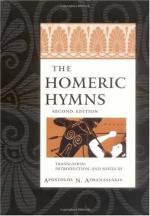XX. TO APOLLO
Phoebus, to thee the swan sings shrill to the beating of his wings, as he lights on the bank of the whirling pools of the river Peneus; and to thee with his shrill lyre does the sweet-voiced minstrel sing ever, both first and last. Even so hail thou, Prince, I beseech thee in my song.
XXI. TO POSEIDON
Concerning Poseidon, a great God, I begin to sing: the shaker of the land and of the sea unharvested; God of the deep who holdeth Helicon and wide AEgae. A double meed of honour have the Gods given thee, O Shaker of the Earth, to be tamer of horses and saviour of ships. Hail Prince, thou Girdler of the Earth, thou dark-haired God, and with kindly heart, O blessed one, do thou befriend the mariners.
XXII. TO HIGHEST ZEUS
To Zeus the best of Gods will I sing; the best and the greatest, the far-beholding lord who bringeth all to an end, who holdeth constant counsel with Themis as she reclines on her couch. Be gracious, far-beholding son of Cronos, thou most glorious and greatest.
XXIII. TO HESTIA
Hestia, that guardest the sacred house of the Prince,
Apollo the
Far-darter, in goodly Pytho, ever doth the oil drop
dank from thy locks.
Come thou to this house with a gracious heart, come
with counselling
Zeus, and lend grace to my song.
XXIV. TO THE MUSES AND APOLLO
From the Muse I shall begin and from Apollo and Zeus. For it is from the Muses and far-darting Apollo that minstrels and harpers are upon the earth, but from Zeus come kings. Fortunate is he whomsoever the Muses love, and sweet flows his voice from his lips. Hail, ye children of Zeus, honour ye my lay, and anon I shall be mindful of you and of another hymn.
XXV. TO DIONYSUS
Of ivy-tressed uproarious Dionysus I begin to sing, the splendid son of Zeus and renowned Semele. Him did the fair-tressed nymphs foster, receiving him from the king and father in their bosoms, and needfully they nurtured him in the glens of Nyse. By his father’s will he waxed strong in the fragrant cavern, being numbered among the Immortals. Anon when the Goddesses had bred him up to be the god of many a hymn, then went he wandering in the woodland glades, draped with ivy and laurel, and the nymphs followed with him where he led, and loud rang the wild woodland. Hail to thee, then, Dionysus of the clustered vine, and grant to us to come gladly again to the season of vintaging, yea, and afterwards for many a year to come.




